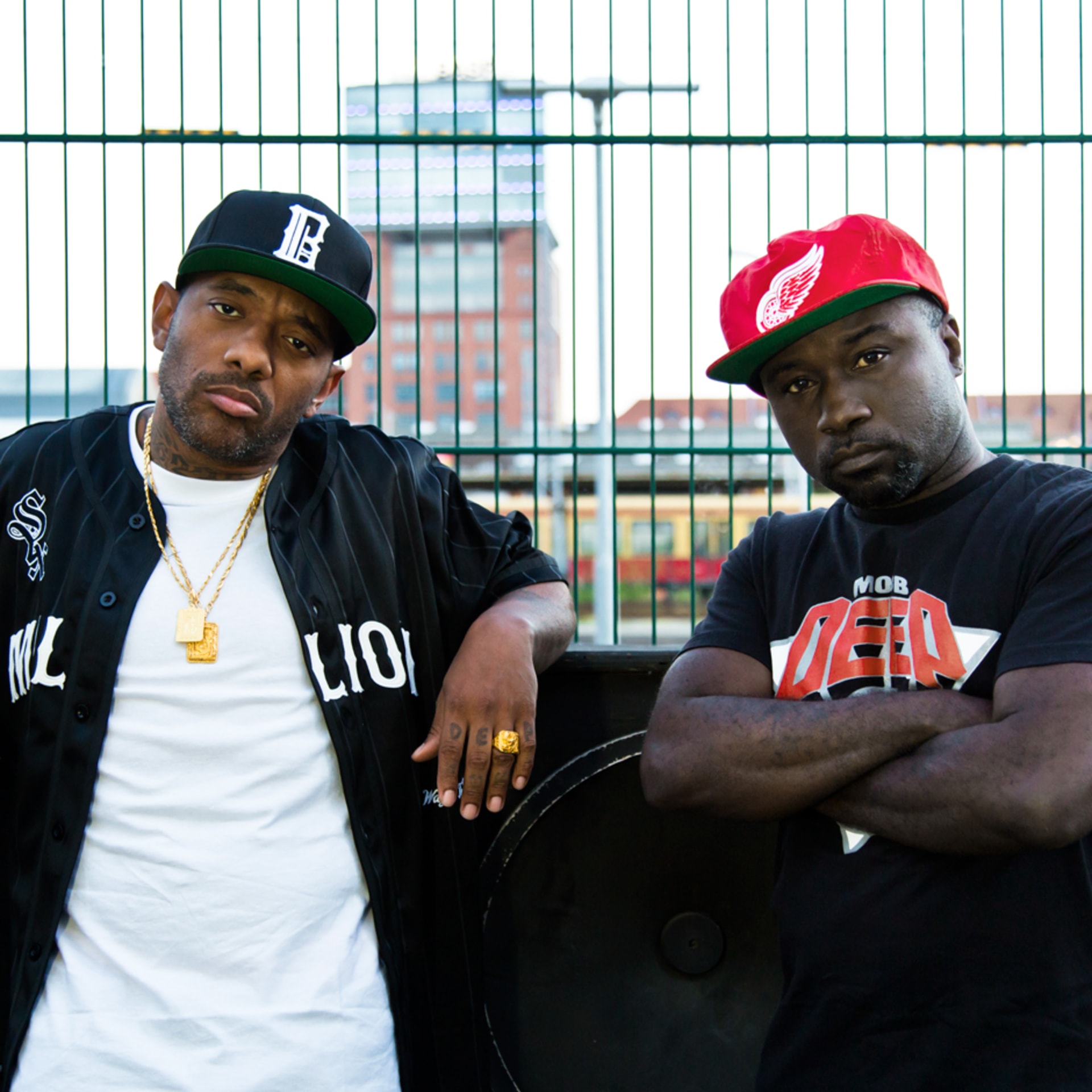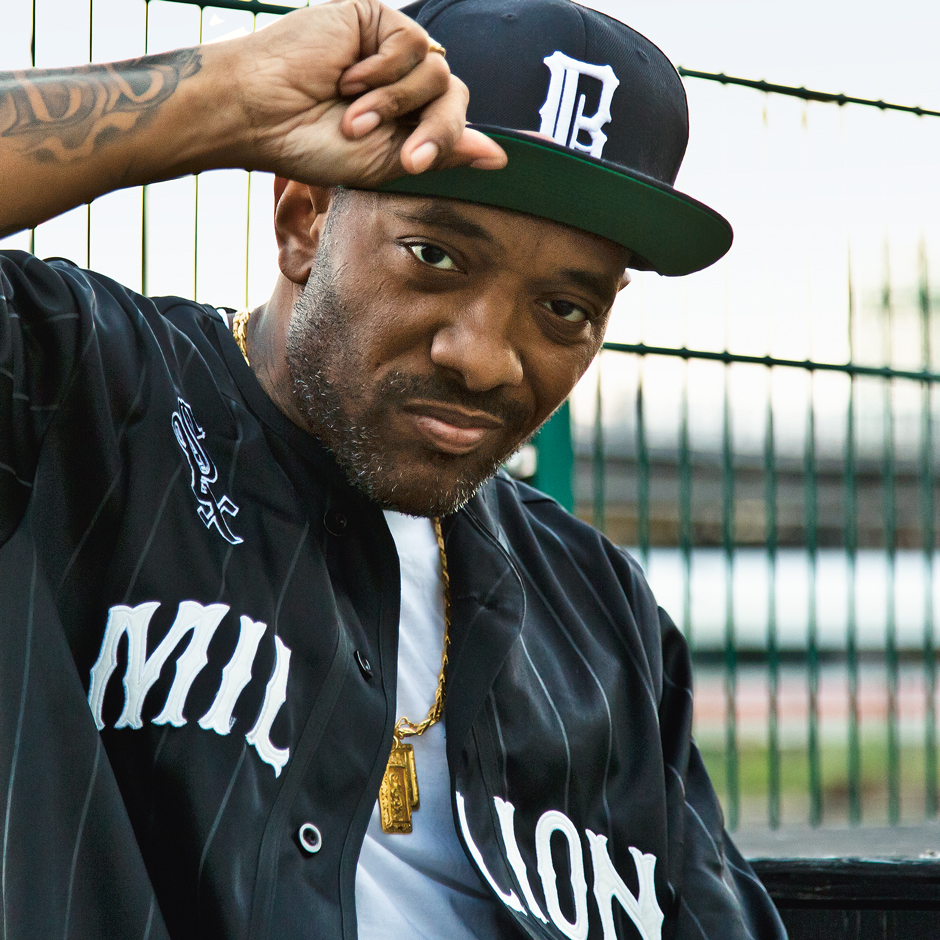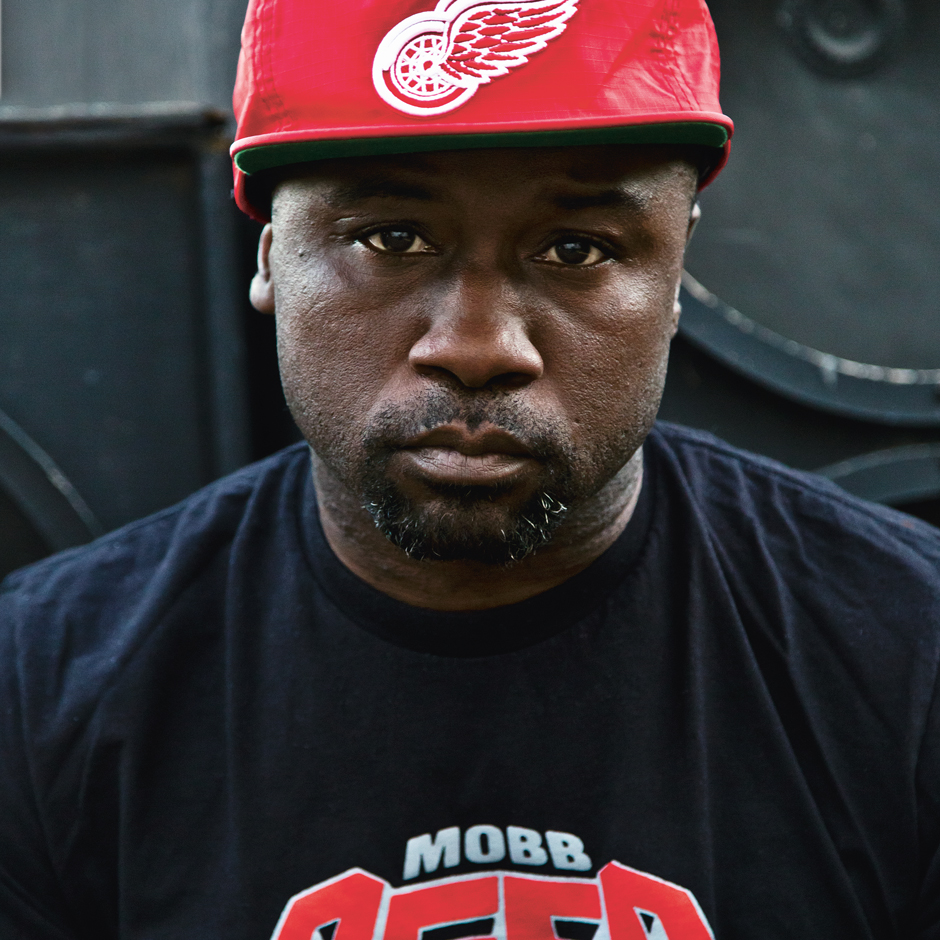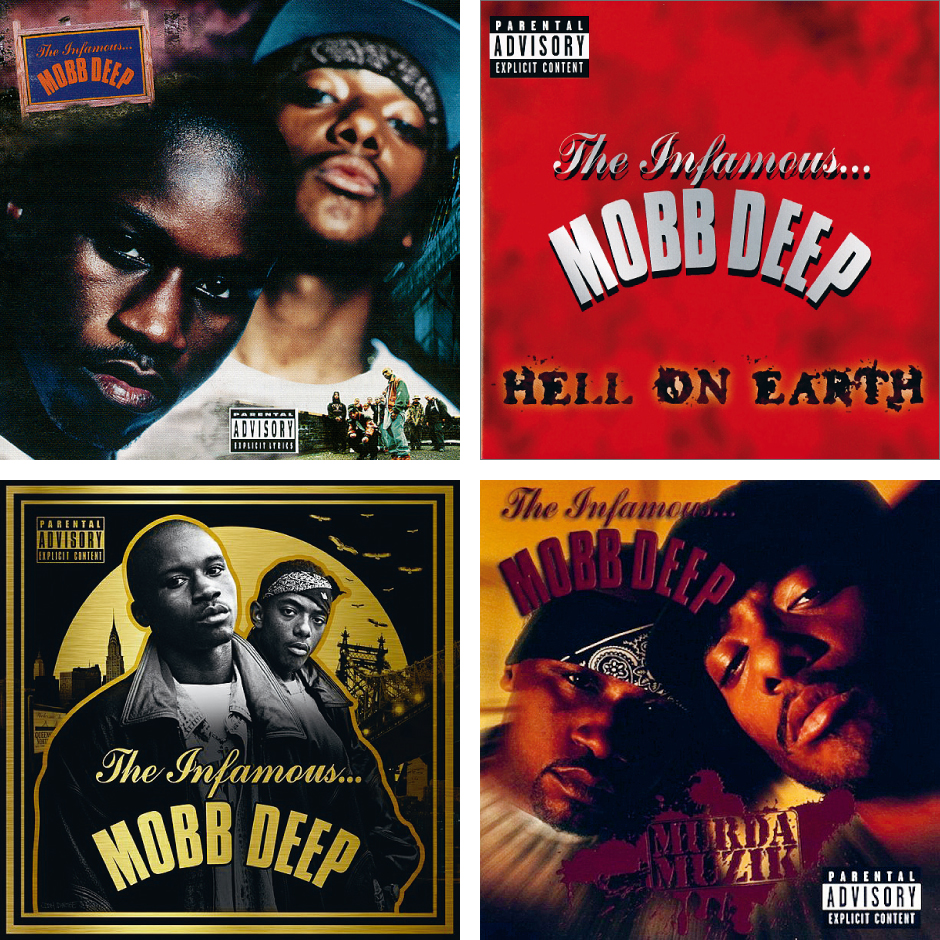
“Hip-hop is our therapy” – Mobb Deep interviewed
Mobb Deep are nothing if not survivors. As teenagers in the mid-nineties, Albert Johnson and Kejuan Muchita created an era-defining sound in hip-hop that was at once uniquely jazzy, deep and thugged-out. Since then, the duo have assumed the role of perennial hip-hop phoenix, emerging from ugly public Twitter feuds, gun violence, and incarceration to be seen as one of the greatest and most painfully honest hip-hop acts of all time.
Havoc, people know about the life of Prodigy from his autobiography, which came out in 2011. Of course, you feature prominently in that as well, but less so your musical background growing up. What was happening in your house musically as a kid?
HAVOC: Well, I didn’t have an older brother, so it didn’t come from there. But my father was a DJ. He used to seriously blast soul and funk and R&B stuff from the seventies all the time in my house. It embedded music in me also because I heard it at night as a child, especially when I was trying to sleep. I’m surprised me and my brother didn’t go deaf, for real. But I’ve also always been into art. Me and P [Prodigy] went to the Manhattan High School of Art and Design, so we’re creative types, you know? And speaking of teenagers, it’s amazing to see kids at shows these days who are eighteen or twenty years old who know all the lyrics to everything, from The Infamous to the new album. And there are plenty of ladies, which is weird, because we make thugged out music. I mean, this ain’t romantic.
I wanted to ask about your brother, Killa Black. He pops up in lyrics all over your records, especially on The Infamous. On “Temperature’s Rising,” for example, you describe him being on the run and covering up evidence for his crimes. It’s not the most uncommon story for the crew you ran with in the projects in Queensbridge, but your brother ended up not getting killed by someone else but rather taking his own life.
[Prodigy arrives at table, picks up a rock of crystalized brown sugar on the table.]
PRODIGY: Yo, this shit look like Molly here, yo. MDMA. Brown sugar. What were you guys talking about?
HAVOC: Killa Black. Yeah, that shit came out of nowhere. Imagine getting woken up at five o’clock in the morning and someone telling you your brother’s dead. But my brother was kinda wild and was into the streets, so somebody waking me up and telling me he’s dead, the first thing I’m thinking is, “Did he get into a shootout?” The last thing I thought was suicide. And this was my brother. Not a stepbrother or a close friend. That shit hurt.
Prodigy, in your autobiography the way you describe Killa Black’s suicide is that he had been behaving differently after he got shot and had a bullet lodged in his head—that he suffered from depression after the trauma.
PRODIGY: Shit, that would make anybody different.
HAVOC: The bullet that hit him in the head was actually a ricochet. And after it was lodged there for a while he got real quiet. We actually had to put him in a psychiatric hospital for a little while. And then he would snap out of it. He was going through some mental issues.
So, Mobb Deep blew up when you were extremely young and struggling with a lot of real life shit. Aside from all the violence of the streets, Prodigy, your father also died of AIDS. Do you at all associate the darkness of your music with a kind of haze of depression? Your early albums come across as dark and threatening, but also deeply sad.
PRODIGY: I definitely had a lot to be depressed about in my life, a lot of depression and anger and resentment and everything. Foul, word. So yeah, that’s a big part of my life and became a big part of our music. Rap music is a good way to let out that energy.
HAVOC: You know, all the shit that we went through kind of gave us the platform to do what we do. It’s a fucked up platform, but we got to share our life with the world—either for people who could relate to it, or people in the suburbs who want to learn about what’s going on in the hood. And as a writer you write about your life experiences. You’re candid with the people that are listening to you because they’re listening. That makes the message that much more authentic. Hardship might be something that some people are afraid to share, but with us, we share our pain and we wasn’t ashamed of it because it made us who we are. You know what I’m saying? It’s a powerful voice.
Had you guys ever thought about seeing psychologists or going to therapy?
PRODIGY: Hip-hop is our therapy. I can’t see myself sitting here talking to somebody like, “Hi, we’re going through this and this.” Like, what are you going to tell me? There’s nothing that you could tell me. My experience told me more than what you going to tell me. Going through the bullshit is going to tell me more. I would rather sit down with a beat and get it out, you know what I mean? It’s a stress reliever, man. Word.
Guns always seemed to play a big role in your music and lives. On “Quiet Storm” off 1999’s Murda Muzik, Prodigy, you describe how your dad taught you how to shoot when you were seven, and that the loudness used to scare you. You go into greater detail about it in your autobiography. Havoc, do you have a first memory of holding a gun?
HAVOC: I can’t remember the first time I held one, but I remember the first time I got in trouble with a gun was when I shot somebody by accident. That’s how inexperienced I was with it back then. It’s funny now, but it wasn’t back then. Basically, I shot a representative from Def Jam in the stomach playing around with a gun in their offices while we were trying to get them interested in our music. I was bugging, almost had a nervous breakdown after. That’s when me and P was first trying to get on, you know. That could have been a major setback. But that motherfucker had angels around him, you know what I’m saying? That shooting could have changed the course of everything. I don’t think even today somebody could have gotten away with it.
Prodigy, you describe what happened in your book: Havoc asks for a bunch of posters from the Def Jam rep, and while he was going to give them to you guys, Havoc jokingly threatened to shoot him for them. And then when the gun accidentally went off, you guys ran out but got held up by a bunch of undercover cops. But in court the guy testified that it was all a big mistake, right?
PRODIGY: Pretty much. I actually still see him from time to time.
And is he friendly to you guys, like “Hey you shot me, but no big deal.”
PRODIGY: He knows it was an accident. He can’t feel no type of way.

Above: Prodigy photographed by Elena Panouli
Prodigy, you also come from an impressive musical background, to say the least. Your grandfather was the bebop sax legend Budd Johnson, your mother was in the sixties female doo-wop group The Crystals, and your grandmother owned one of the most famous dance schools in New York City. It’s interesting how many rappers have this direct jazz connection, especially ones you were affiliated with, like Nas and his father, cornettist Olu Dara.
PRODIGY: I definitely learned a lot of discipline from my grandfather, man. He used to sit up all night writing sheet music and writing lyrics to songs. I could remember when I was, like, five years old, sitting on his lap while he was writing music, smoking his pipe. That’s all he used to do every day and all night: write music and watch the Mets play baseball. Oh yeah, and play golf. He also had all these tour posters all over his wall from Russia and Germany and all over the world. Growing up seeing all that and going to his shows when I was young, going into the Blue Note in Manhattan and seeing his albums definitely inspired me musically, just seeing how he did it. But it wasn’t until later that I realized who he really was, how famous. I ain’t know, I was too young.
When I got older, people were like, “Yo, your grandfather, he’s ill . . .” That’s when I really learned to appreciate it. And you know, he died on tour in his hotel room in his sleep, which was kind of crazy. But also New York is an ill place with ill music. My grandfather’s generation was when jazz was really happening all over the world, then my parents generation was doo-wop, and then the next generation was hip-hop.
But yeah, my moms replaced a girl in The Crystals who had gotten pregnant, but my moms didn’t really get any royalties or anything. She used to tell me horror stories and say, “Don’t be spending all your money on tour eating steaks every night. And make sure you getting your royalties!” She actually managed Mobb Deep in the beginning but I had to fire her, yo. We got into an argument one night at a talent show early on in our career because we were cursing in our songs. We actually cursed out the talent show director because he told us we couldn’t curse onstage. So we were like, “Yo, fuck you! We Mobb Deep!” My mom was like, ‘You can’t talk to people like that!” and we’re like, “We can do and say whatever we want!” And then we fired her.
That’s cold.
PRODIGY: It’s all good. Anyway, we on tour now and I’m eating right and all that. Actually, eating healthy is something very important for me. On the road it’s hard but when I’m home, I’m on some strict diet shit. For my sickle cell I have to be. It stops me from being sick when I eat a lot of vegetables and drink a lot of water.
I know sickle cell anemia can be a debilitating disease, and when you used to get attacks you would have to go to the hospital and get pain meds. I know you got out of jail in 2011 after doing three-and-a-half years for gun possession. Was it hard to eat healthy with the food they have there?
PRODIGY: Actually, in jail it was even easier to stay healthy, because every month you get thirty-five pounds of food in a package. So every month, I would get my wife to send me thirty-five pounds of green vegetables. Everybody else got snacks—Oreos, chips, all types of junk food. But not me. I would eat my package and the jail food, you know what I mean? And I drank mad water.
Did you have a cellmate?
PRODIGY: Nah, I had my own cell. I was in a special housing unit, you know what I mean? Because of my celebrity status or whatever. It was hard being away from my family, away from my career, away from the studio, away from all my friends. But dealing with the inmates and all that shit, that could be another headache. But I didn’t really have any problems as far as that shit. There were a couple of people I was cool with. But I was more focused on myself, on my health, focused on my writing, focused on working out. That kept my mind occupied.

Above: Havoc photographed by Elena Panouli
Over the years, there had been plenty of voices proclaiming Mobb Deep as the sort of unsung heroes of golden era NY hip hop. Of course you got your due, but you never quite achieved the superstardom of your peers like Nas, Wu-Tang, Diddy and later Jay-Z. Slowly but surely, however, The Infamous is increasingly being seen as one of the most important hip-hop albums of all time. How do you explain that kind of up and down development?
PRODIGY: I think Mobb Deep music is way more aggressive. Yeah, aggressive—that’s the perfect description. That’s what made us different.
HAVOC: Plus, the dudes you mentioned was the type of artists that was chasing radio singles anyway. That was their purpose. I ain’t saying there’s anything wrong with it, but that’s what they was doing.
PRODIGY: Yeah, Jay-Z was chasing the Top 40 radio single, you know what I mean? He’ll tell you himself. I remember I had a meeting with Jay and Sam Scarfo and all he kept talking about were the charts on Billboard, from Number 10 to Number 1. He focuses on making a record that charts. We focus on making a record, period.
Pitchfork journalist Jayson Greene recently reviewed both the supposed “rerelease” of The Infamous, which never was, as well as the new double record The Infamous Mobb Deep. He gave the The Infamous a perfect 10 but the new stuff a 4.9, which seemed to have pissed you off, Prodigy. You responded on Twitter by calling him a “bitch boy” and saying that you were looking for him. What was up with that?
HAVOC: Wait, what happened?
PRODIGY: Yeah, you could tell that dude did not listen to the damn record at all with his review. I don’t know what he was going off about but he clearly didn’t listen. All he kept talking about was the old songs, he barely said anything about the new ones. So I went in on that nigga. But I was just fucking around.
What was interesting though is that you went off about it in more than one tweet, and one point you wrote, “If u don’t come from our bloodstream, how can u make a proper assessment of our music? U don’t understand it. U a outsider peeking in.” Was that a critique of white people trying to overanalyze hip-hop but not knowing about the hood?
PRODIGY: No, it’s not about race. I meant my bloodline. I was talking about experience. I was talking about how he don’t come from where we come from. He not a part of that world, so how could he make a proper assessment of that world? He know nothing about it. Nothing. I mean look at this guy! He don’t know what he’s talking about with Mobb Deep. Maybe he knows what he’s talking about with Jay-Z, but probably not with that either. I can tell when people know our music. Word.
Prodigy, one of the things you have rapped a lot about in the past is mysticism and the Illuminati, especially the writings of Dr. York, who founded the Nuwaubian movement and discussed various religious and extraterrestrial themes in his books, many Afro-centric. How did you get into that?
PRODIGY: It’s not just Afro-centric at all. Dr. York is an ill researcher originally from Brooklyn who wrote a lot about history and religion and cultures and stuff like that. I bumped into his books when I was on my way to high school in the city. They sold his books at these stands on Jamaica Ave in Brooklyn and in Manhattan—just tables on the street with incense and oils and these books. It interested me, because it was a lot about language and a lot of stuff they don’t teach you in school. He talks about the Torah, the Koran, the Bible, and he talks about all cultures and races. It’s the history of the world. And you’ll bump into the Illuminati in his work too. But that word is just a piece of the puzzle. It’s just one dot out of a million dots you gotta connect. Everybody gets caught up in it. But when you’re researching and learning about the world you live in, you’re bound to bump into that word, “Illuminati.”

Hip-hop history, clockwise from the top: 1995’s The Infamous is one of the greatest hip-hop albums of all time; 1996’s Hell on Earth cemented the group’s rep as grimy, hardcore hip-hop philosophers; 1999’s Murda Muzik saw the duo move into baroque sample territory, though the single “Quiet Storm” remains a minimal masterpiece; 2014’s double album The Infamous Mobb Deep contains both previously unreleased takes of classic tracks from The Infamous, as well a few future classics.
In the past, you’ve compared reading about the teachings of Dr. York to John Carpenter’s They Live, where the main character, played by the former pro wrestler Rowdy Roddy Piper, puts on special sunglasses and is able to see the world as it really is: who is an alien pretending to be human and who’s really human, as well as all the controlling subliminal messages we’re surrounded by everyday.
PRODIGY: When I saw that movie, I realized how ill John Carpenter’s metaphor was. People tend to take movies literally, like science fiction. But a lot of these movies have real information in them and writers have to hide it in the words “science fiction.” The messages are hidden in the metaphors. It’s hard to talk to people about that information who can’t see what I’m talking about. They don’t get it until they do their own research. They put their own glasses on and then they can see.
What about politics? Can you vote after being convicted of a felony?
PRODIGY: Yeah, I can vote if I register. But I wouldn’t vote. I don’t believe in the system. But I believe people should vote, so don’t go by my opinion. Get involved. To me though, I know too much shit. It bothers me too much. I know that Democrats and Republicans are two wings of one bird. I know that congress gets paid off to not pass certain laws and to pass certain laws. They get bags of money. Powerful people in congress get bags.
HAVOC: The illest part about that is that people accept it!
PRODIGY: People are so sedated with entertainment. That’s how the Romans used to do it. That was the purpose of the Coliseum: to keep people’s minds occupied with sports and entertainment while they were changing the laws and the monetary system. Remember when they used to fight with lions and gladiators and all that shit? That was the purpose: to keep people not thinking. If you read history, they even admitted it.
So what’s the modern day Coliseum?
PRODIGY: Movies, Internet, cars, jewelry, fashion, video games, music . . .
Capitalism?
HAVOC: You say capitalism? Yeah, one big distraction. People care about the things they really should care about the least. Because people are so turned off by politics they think that voting doesn’t count, doesn’t make a difference. And to a certain degree, they’re right. At the same time, when you see politicians taking bags of money from corporations and at the same time you’re wondering why oil is spilling into the oceans destroying the earth.
PRODIGY: But voting does count for something when you vote “None of the above.” But only when everybody votes that.
What about Obama?
PRODIGY: I like Obama because he’s black. He inspires young black kids. We been through a lot—slavery, all kinds of foul shit—so to have a black president inspires my son and my daughter and other little black kids. That’s the only thing I like about him. Other than that: fuck him. I don’t like what he represents, I don’t like his policies. I don’t like the system, period. But it’s my right not to agree. It’s my human right to say I don’t agree with you, I don’t like you, I don’t want nothing to do with your system. People should vote though and get involved with politics and the voting system so they can learn its power. But me? Nah man. I’m not gonna vote for some dummy they put in front of me. It’s all fucked up. It’s all corrupt. Although sometimes I like watching the debates between the candidates. They hilarious. I’ll sit there and it’s just like comedy, yo.
Prodigy, you always considered yourself kind of precocious. Like you said on “Shook Ones,” “I’m only nineteen but my mind is old.” Somehow, I feel like this is also reflected in your attitude towards gay people. You’ve said in interviews that you couldn’t care less if somebody is gay or not. That’s a tolerant take on homosexuality, as hardcore hip-hop goes.
PRODIGY: It’s just a reality in the world and you have to live with it. The gay is not going to go away, it’s here to stay. There are gay people in the world, you know what I’m saying? Deal with it.
HAVOC: And a lot of people have gay family members but shy away from saying that. I got gay uncles, you know what I’m saying? I’m not ashamed to say that.
Who doesn’t have a gay uncle? Anyhow, do you guys have favorite rhymes or beats of each other?
HAVOC: Oh man, there so many, for real. And this is gonna sound clichéd, but I have to say that when I first heard Prodigy’s “Shook Ones” verse, that shit totally blew me away. And every time I hear it. I’m like, what the fuck was he thinking back then being so young?
PRODIGY: My favorite Hav song is “Handcuffs.” It’s the type of beat you don’t even think Hav do.
HAVOC: But back to “Shook Ones.” How you gonna be like, “There’s a war going on outside no man is safe from”? You gonna set it off with that? I mean years later, that’s an ill fucking line. And it’s always gonna be an ill line. Forever. ~
This article was originally printed in the Fall 2014 issue of Electronic Beats Magazine.
Published October 30, 2014. Words by A.J. Samuels.
